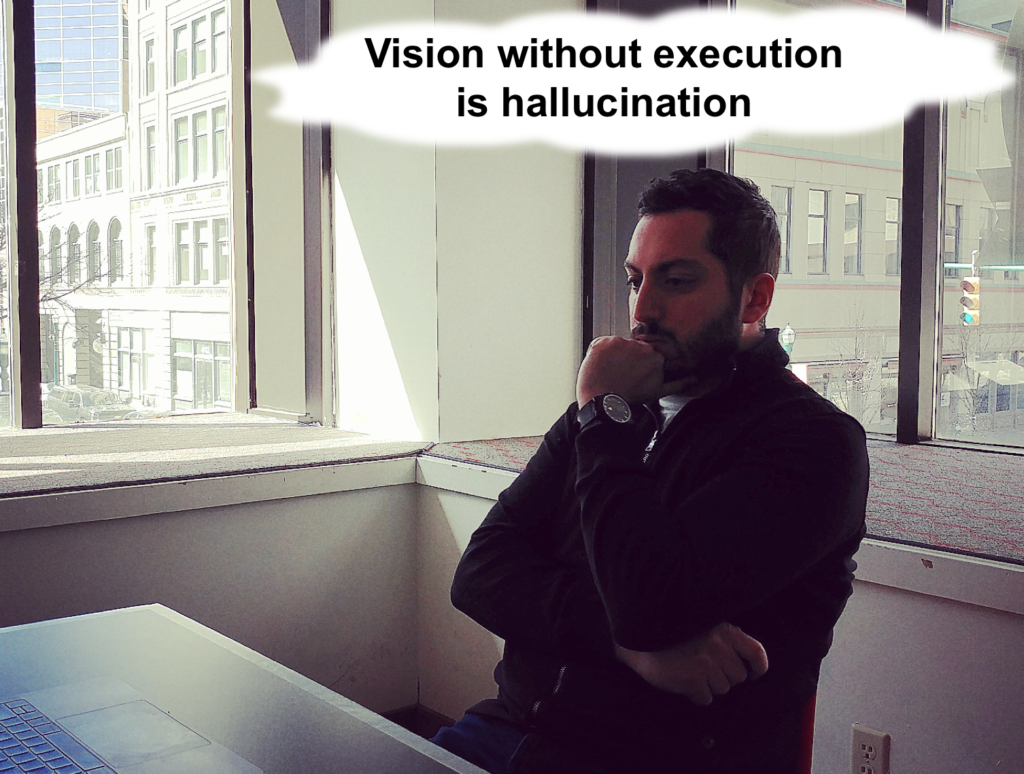One entrepreneur this week actually told me: "My advisor thinks I'm going to be the next Steve Jobs."
Another, when I asked him "How are you going to compete with the $100B multinational direct competitor?" answered: "They just don't have the vision."
Not to be a Debbie Downer but every entrepreneur has a grand vision. If that's all it took the world would be home to a lot more billionaires than it currently is. So what does it actually take to make your vision a reality?

These are the words of Jeff Bezos in his 1997 letter to Amazon shareholders. Granted, in 1997 Amazon had already been through an IPO and was growing revenues at over 800% per year so Jeff had quite a platform of credibility to stand on. Nevertheless Jeff's vision at a time when "... the Web was ... the World Wide Wait." was pretty profound and highly predictive of what Amazon looks like today:
"Today, online commerce saves customers money and precious time. Tomorrow, through personalization, online commerce will accelerate the very process of discovery."
"Amazon.com uses the Internet to create real value for its customers and, by doing so, hopes to create an enduring franchise, even in established and large markets." (remember at this time Amazon was just an online bookstore)
"We also believe there are significant opportunities to better serve our customers overseas, such as reducing delivery times and better tailoring the customer experience." (this is 8 years before Amazon launched Prime shipping)
What's perhaps more amazing about this letter however is that it also provides an outline of his thinking and his strategy for how he turned that vision into a reality. Much like I tell our founders to do with their pitch deck slides, Jeff's action plan can very nearly be summarized by the letter's subtitles:
It's all about the long term: I think the idea of investing in the long term is often grossly misunderstood by entrepreneurs. Instead of taking this for what Jeff really means: prioritizing the company's time, efforts, and investments to focus on addressing large market opportunities that may take time to pay off versus going after short term revenues and gains, many entrepreneurs interpret this idea as an excuse to stay in their comfort zone. Instead of hustling to test market hypotheses and generate early traction, entrepreneurs will instead cower to their corners and contemplate about how to build out their vision for this "great" company. As a result their vision never becomes anything more than that because they never truly took the first step forward.
Obsess over customers: On the face of it this seems unbelievably obvious even to non-business people, but it's hard to truly appreciate what he's saying unless you've worked on a business where that wasn't the case or maybe that it took a backseat to something else for a moment. Two things in particular stood out to me from this section:
He described the Internet as the World Wide Wait. (remember this is the late 90's) Since online shopping was nowhere near as ubiquitous as it is today he needed to create a very unique value proposition that was only possible with the internet. He chose books because "We brought them much more selection than was possible in a physical store (our store would now occupy 6 football fields), and presented it in a useful, easy- to-search, and easy-to-browse format in a store open 365 days a year, 24 hours a day."He focused relentlessly on how to offer customers as much real value as possible. I chose my words very carefully there. "Offer" meaning he didn't just bend over. Anything he gave away "for free" he had an end game for it that he bet would pay huge dividends later. "real value" because he didn't focus on just having better tech or more features. He saw each new offering as an investment. If customers liked it he doubled down and if they didn't he turned it off.Infrastructure: At the time this section could easily have been interpreted as the company expanding it's operational capacity. In retrospect however it's clear Jeff was thinking about what has since become one of Amazon's most incredible business models: the monetization of their infrastructure. It's these investments which would eventually lead to such notable services as AWS and Fulfillment by Amazon.Our employees: Here Jeff very succinctly lays out the company's, at times controversial, culture: "when I interview people I tell them, "You can work long, hard, or smart, but at Amazon.com you can’t choose two out of three."" No matter your views on Amazon's employment culture today the fact he included this section in the report is indicative of his realization that you need an army to build an empire.Goals for 1998: There are countless cliche's which each make the point that in order to achieve big long term goals it requires you to set and achieve a number of small short-term milestones along the way. Jeff laid out a vision in the beginning but focused his efforts at the end of the letter on how Amazon would progress toward that vision in 1998."We are planning to add music to our product offering, and over time we believe that other products may be prudent investments.""We also believe there are significant opportunities to better serve our customers overseas, such as reducing delivery times..."There are two primary cop-outs entrepreneurs will often take regarding their vision: 1) it becomes the only thing they think about and so they fail to focus on the business as it is today or 2) they're very good at making themselves "busy" working in their business without actually taking the time to work on their business. What I love about this letter is that Jeff both laid out the long-term vision of the business while at the same time maintaining focus on executing the near-term milestones necessary to make it a reality.